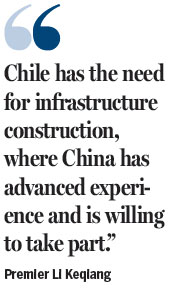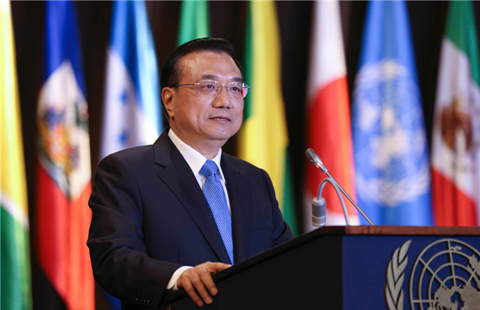Li seeks 'dual track' for Chile exchanges
Updated: 2015-05-27 07:31
By Zhao Yinan in Santiago and Zhang Yunbi in Beijing(China Daily USA)
|
||||||||
Premier Li Keqiang urged corporate leaders from China and Chile to invest more in each other's country to provide new incentives for bilateral economic exchanges, which now focus mainly on trade in merchandise.
Compared with frequent exchanges of commodities, the two countries have greater potential for industrial and investment cooperation, he said.
This should be boosted to create a "dual track" for economic exchanges, together with merchandise trade between the two countries, the premier said.
He was addressing more than 100 corporate leaders from both countries at a ceremony marking the 45th anniversary of ties between the two nations.
The "dual track" the premier alluded to refers to trade and investment.
"Chile has the need for infrastructure construction, where China has advanced experience and is willing to take part through the build-operate-transfer or public-private partnership," Li said.

Chile was his last stop after visits to Brazil, Colombia and Peru.
Chile is China's third-largest trading partner in Latin America, the second-largest source of imports and the third-largest export market. Last year, the bilateral trade volume reached $34.1 billion, or 23 percent of Chile's total foreign trade.
On Tuesday, Li said the deals signed on Monday with the Chilean government to encourage currency swaps, avoid double taxation and to open the first yuan settlement bank in Santiago would attract more Chinese investors to Chile.
"It is a clear signal that the government encourages more bilateral investment," he said.
Lu Siheng, who researches Latin America at the Chinese Academy of Social Sciences, said it is ideal for the two countries to "take financial cooperation as an engine" and make sure "both trade and financing are running simultaneously within the cooperative framework".
Chile faces shortages of energy and infrastructure and has a less-diverse economic structure, while China has leading technologies and experience in the equipment manufacturing and infrastructure sectors, she said.
Tang Jun, deputy head of the Institute of Latin American Studies at Zhejiang International Studies University, said the slowing pace of growth in Latin American economies in recent years and "the slumping demand for raw materials and shrinking global prices are overlapping" with these vulnerabilities.
Contact the writer at zhaoyinan@chinadaily.com.cn

 California oil spill takes toll on marine mammals
California oil spill takes toll on marine mammals
 Ten photos you don't wanna miss - May 27
Ten photos you don't wanna miss - May 27
 Family photos for mountain-dwellers
Family photos for mountain-dwellers
 A young part-time chauffeur on the road
A young part-time chauffeur on the road
 Death toll from heat wave in India nears 800
Death toll from heat wave in India nears 800
 Tech giants shine on Intl Big Data Expo 2015
Tech giants shine on Intl Big Data Expo 2015
 Premier Li urges production capacity co-op between China, LatAm
Premier Li urges production capacity co-op between China, LatAm
 US honors war dead on Memorial Day
US honors war dead on Memorial Day
Most Viewed
Editor's Picks

|

|

|

|

|

|
Today's Top News
Li seeks 'dual track' for Chile exchanges
China cautions US over
South China Sea
China, Cuba emphasize confidence
Storms kill 16 in Texas, Oklahoma; Houston flooded
Obama to host South Korea's Park in mid-June
California oil spill takes toll on marine mammals
China issues first white paper on military strategy
China, Chile ink multi-billion-USD currency swap deal
US Weekly

|

|






